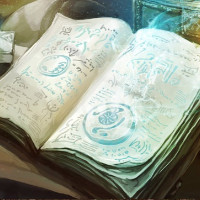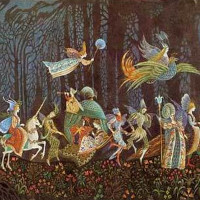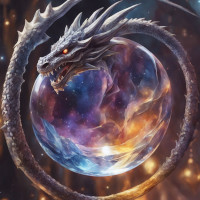Skill
| ☰ Starting Guide | |
|---|---|
|
|
|
Introduction
Skills are a game rule for what a character can do or understand within a story. They are a form of mental or physical proficiency cultivated through repetition and theory. Examples include swinging swords (Melee Combat), running a triathlon (Endurance), strengthening one’s mind (Meditation), or performing acrobatic feats (Acrobatics). Everyone can consider themselves a Novice at every non-arcana Skill until they assign enough experience points to become an Apprentice. See the Skill List or scroll to the bottom of this page for a list of skills your character may assign their experience towards.
- There are no social skills on Antarok; these are handled through the presentation of one's character and other's interpretation within the plot.
Progression
Experience is earned primarily through writing stories within Antarok. The standard rate is 1 XP per 150 words written solo, and 1 XP per 100 words written collaboratively. See Thread Types for more information.
- XP is spent towards the next tier of that skill in the skill ledger on your character sheet. Everyone can be assumed to be a Novice in every non-arcana skill. Sometimes a Merit is spent instead of XP; each Grandmaster Skill requires Mastery as well as the expenditure of a Minor Merit to attain. Characters starting on Antarok begin with 250 XP to allocate as they wish, meaning they could feasibly start with a Grandmaster skill if they put their first merit towards it, but they wouldn't be good at much else.
Note: Personal Arcana requires spending a Minor Merit to unlock Novice; Theorems do not.
Skill Tiers
- T0 = Novice (0 XP)
- T1 = Apprentice (25 XP)
- T2 = Journeyman (50 XP)
- T3 = Expert (100 XP)
- T4 = Master (250 XP)
- T5 = Grandmaster (250 XP + Minor Merit)
Example: Joe has no XP in Fishing and is therefore a Novice at fishing. He spends 25 XP to become an Apprentice, spending an additional 75 XP to become an Expert and so on until he has spent a total of 250 XP to become a Master. He then decides to spend XP on a Minor Merit to become a Grandmaster.
Interpretation
Skills are not always hardline indicators of ability. Biology, similar skills, habits, and circumstance can still be factored into reasoning to a small extent, but care should be taken not to overplay the character’s abilities. This reasoning can never push a character beyond what an Apprentice could do. Skills are also a measure of your ability to handle adversity; everyone can ride a horse without issue, but they risk getting thrown off in the event of the horse getting spooked if they don’t have the skill to back it up.
XP in a skill indicates how much knowledge and practice your character has taken up on their own; your character also has a life beyond play - it can be assumed they have a routine for practice or have read a book on a subject they are skilled in, and they might even be able to recall information from that book if they have the XP to back up the understanding. It's reasonable for a Competent Herbalist to know the flora in a well-documented region, and an Expert might recognize similar species somewhere they haven't studied.
Novice
- With zero experience you are capable of very little beyond the limitations, instincts, and traits of your own biology and habits. You don’t really understand how you do what you do, and what little you are capable of is often attributed to things you do every day. Treat this with reasoning; someone who is a smith as their job would have a reasonably mean and accurate hammer swing, even as a Novice in their combat skills. You are not expected to always fail, but you’ll often struggle with situations out of the norm.
Example: Johnathan springs up from his seat, fighting with what has to be the biggest catch of his relatively young life. The line grows taut, the pole bending and straining. Pulling firmly, he catches a fish - but it's not the fish he wants, and it's much smaller than he thought. He'll have to figure out some different bait; hopefully the line doesn't snap like last time!
Apprentice
- You've begun to understand the basics of the skill, and you might happen to know a few interesting facts about it. You are competent enough to operate this skill without issue as any other rank-and-file person in that trade might. Inventing something useful is still beyond your ability.
Example: The sound of metal striking metal rings out through the forge. With a final strike, the smith pulls his weapon off the anvil, and quenches it in a nearby barrel. There's a loud, drawn-out, hiss as the blade rapidly cools into a tempered blade of steel. Pulling it free, the smith shows his flawed product to the forgemaster who finds the quality acceptable for sale.
Journeyman
- You are beginning to possess a regimented understanding of the skill. You might be able to repeat some wise words from your mentor or formulas from a book you've read. Your inventions without assistance struggle to hold water, often ending in failure.
Example: Leaping up into the air, Katrina brings her right foot high above her head and strikes quickly. A paving stone cracks down the middle as she lands her final blow against an imaginary opponent.
Expert
- You understand a large sum of theory and potential pitfalls with the skill. You can recall whole theorems of understanding, and you’re beginning to develop your own unique theory regarding its application. Your inventions can be useful after a few failures and refinements.
Example: An assassin swings his rifle off of his back, and gets into position. The shot is a far one, but not for him. Should be quite easy. Taking a deep breath and exhaling only halfway, he squeezes the trigger, loosing a round from the chamber. The bullet streaks over, striking his target in the head. He's dead before he even hits the ground.
Master
- You understand almost everything about the subject in a conventional sense, and you’ve developed your own unique theory regarding its application. Your inventions almost always turn out useful.
Example: A small, dark-haired, man is wheeled into the hospital. Doctors and nurses huddle around his mangled body, trying to do the best they can, but he will not survive. As the patient's pulse slows, Doctor Brax orders his colleagues aside and gets to work. Little by little, the patient starts to stabilize.
Grandmaster
- Your understanding and ability has exceeded what can be considered mundane, and your theories often parallel metaphor. Your inventions often have some paranormal quality behind them that only Masters can begin to understand - even Grandmasters who try to replicate these designs fail at replicating it exactly.
Example: An old gnome levels his rifle at a training dummy, before firing a single shot with a slight kick to his barrel, sending the bullet spinning in an arc.
- Grandmasters in a mundane skill begin to push the boundaries of that skill. They are above a Master in efficacy and start to defy what should be possible with unbelievable displays of skill.
Skill List
Below is the list of valid skills. Many skills cover related topics. A Rancher would know how to care for livestock, garden, or farm. A leatherworker would know how to tan, and so on. If you aren't sure what skill governs a specific action, please ask our community in Discord.
Core Skills
|
Body |
Mind |
Science |
Adventure |
Mercantile |
|---|---|---|---|---|
|
Acrobatics |
Acting |
Chemistry |
Deepcraft |
Business |
|
Fitness |
Meditation |
Medical |
Fieldcraft |
Economics |
|
Resistance |
Stealth |
Physics |
Riding |
Espionage |
|
Swimming |
Tactics |
Psychology |
Sailing |
Security |
|
Flight |
Teaching |
Zoology |
Taming |
Ranching |
Combat Skills
|
Swords |
Daggers |
Axes |
Hammers |
Shields |
|
Unarmed |
Marksmanship |
Polearms |
Throwing |
Whips |
Trade Skills
Trade skills mostly have to do with creating some kind of product.
|
Carpentry |
Smithing |
Engineering |
Glassblowing |
Music |
Painting |
|
Culinary |
Sculpting |
Architecture |
Leatherworking |
Writing |
Tailoring |
Arcana Skills
Every skill to do with magic. Categories of Arcana are in bold. Not included are Gramarye or Variants of existing Arcana.
|
Theorems |
Glamour |
Galdr |
Pact |
Poetics |
|
Practices |
||||
|
Blights |
||||
Antarok Handbook
|
Rules of Play |
Terms of Use · Rules of Play · Starting Guide · Experience · Merits · Skills · Skill List |
|
Seasonal Points · NPCs · Duty · Formations · Dungeoneering · Challenge Rating |
|
|
Threads · Calendar · Living Standards · Travel · Rebirth |
|
|
Lore |
|
|
Arcana · Arcana List · Religion · Planes · Metaphor · Alkahest |
|
|
Races |
Races · Mongrels · Bloodlines |
| Mæn [ Human · Æld'Norai · Cor'Norai · Jin'Norai · Dwarf · Gnome ] | |
| Faefolk [ Dragon · Kobold · Inari · Sidhe · Dryad · Pixie · Boggart · Satyr ] | |
| Vokhai [ Orc · Trow · Goblin · Gnoll · Najda ] | |
|
Sofontti [ Doggi · Wolvetti · Foxti · Haretti · Rodentti Lynxetti · Mustetti · Bearetti · Cervitti · Porcitti ] |
|
|
Cambion [ Rakshasa · Djinn · Aeon · Aarakora · Mithræ · Knocker Abyssal · Aranexi · Leshy · Onryo · Daemon · Haemora ] |
|
|
Undead [ Draugr · Ghost · Wisp · Endless · Dracolych ] |
Forum Links [ Back to Antarok · Character Sheets · Ælheim · Support Forum ]


